L-Theanine for BDD: Finding Calm in the Mind
Introduction
Body Dysmorphic Disorder (BDD) is an exhausting condition that traps people in loops of self-scrutiny, anxiety, and emotional turmoil. Thoughts about appearance become intrusive, consuming energy and peace of mind. While therapy and medication remain key treatments, natural compounds like L-theanine are gaining attention for their ability to reduce stress and promote calm without sedation.
This article explores how L-theanine—an amino acid found in green tea—can help calm the overactive brain associated with BDD, improve emotional regulation, and enhance mindfulness-based therapies.
Looking for supplements for This? Click here.
Understanding BDD: When the Mind Becomes Its Own Mirror 🔍
At its core, Body Dysmorphic Disorder isn’t about vanity—it’s about distorted perception and internal chaos. People with BDD experience intrusive, distressing thoughts about perceived flaws in their appearance. These flaws often appear minimal or invisible to others but feel overwhelming to the sufferer.
The brain becomes locked in repetitive loops of checking, comparing, or seeking reassurance. These rituals temporarily relieve anxiety but reinforce the obsession in the long term. Over time, the nervous system becomes hypervigilant, interpreting small sensations or imperfections as threats.
BDD often coexists with anxiety, depression, and obsessive-compulsive tendencies—all conditions linked to an overactive amygdala (the brain’s fear center) and underregulated prefrontal cortex (the logic and control center). This imbalance means emotional reactivity stays high while rational calm remains distant.
That’s where L-theanine may help: by quieting the mental noise and improving communication between these brain regions.
What Is L-Theanine? 🍃
L-theanine is a naturally occurring amino acid found almost exclusively in green tea (Camellia sinensis) and certain mushrooms. It’s responsible for the gentle relaxation many people feel after drinking tea, contrasting with the jitteriness that coffee can cause.
Unlike sedatives, L-theanine doesn’t make you drowsy—it creates a state of relaxed alertness. It increases alpha brain waves, the same patterns observed during meditation, daydreaming, or states of creative flow.
In Japan, monks have long consumed green tea before meditation to sustain focus without losing calm. Modern science now supports what they intuitively practiced: L-theanine promotes mental clarity while easing the physiological tension caused by stress.
The Neurochemistry of Calm: How L-Theanine Works 🧬

L-theanine influences multiple neurotransmitters involved in anxiety and mood regulation, including GABA, serotonin, and dopamine.
GABA (Gamma-Aminobutyric Acid) acts as the brain’s natural calming agent, slowing down neural activity when anxiety spikes. L-theanine increases GABA levels, promoting a sense of safety and relaxation without dulling alertness.
Serotonin contributes to mood stability and self-perception. Low serotonin activity is common in BDD, leading to obsessive thinking and rumination. L-theanine helps regulate serotonin synthesis, supporting emotional balance and cognitive flexibility.
Dopamine, the reward neurotransmitter, helps with motivation and focus. Balanced dopamine levels allow clearer thinking and reduced impulsivity—important for people with compulsive checking or comparison behaviors.
In essence, L-theanine helps the brain shift from survival mode to safety mode, creating an internal environment that supports healing, therapy, and mindfulness.
Looking for supplements for This? Click here.
The Fight-or-Flight Cycle in BDD ⚡
In people with BDD, the brain constantly scans for potential “flaws,” activating the sympathetic nervous system—the fight-or-flight response. This leads to elevated heart rate, shallow breathing, muscle tension, and a flood of cortisol.
Over time, this chronic activation leads to burnout, emotional instability, and even physical symptoms like headaches, fatigue, and digestive issues.
L-theanine helps interrupt this physiological stress loop. By modulating cortisol and reducing excitatory neurotransmitters like glutamate, it gives the body a chance to reset. The result is a calmer nervous system that’s less reactive to self-critical thoughts or environmental triggers.
L-Theanine and Cortisol Regulation 🌿
Cortisol, the body’s main stress hormone, plays a powerful role in mood regulation. Elevated cortisol can heighten anxiety, impair sleep, and intensify body dysmorphia symptoms. Studies show that L-theanine can lower cortisol levels, especially during stressful situations.
In one clinical study, participants given 200 mg of L-theanine before a stressful cognitive task showed significantly lower heart rate and cortisol responses than those given a placebo. This indicates that L-theanine may help buffer the body’s physiological reaction to perceived threats—a major benefit for those with anxiety-driven disorders like BDD.
By keeping cortisol in check, L-theanine allows the mind to process discomfort with greater resilience rather than panic.
Calming the Overactive Brain 🧘
Brain imaging studies reveal that people with BDD have hyperactivity in the visual and emotional centers of the brain. They process details excessively, noticing imperfections others don’t. This over-focus amplifies emotional responses and reinforces negative self-talk.
L-theanine helps balance brain wave activity by promoting alpha waves, which are associated with calm focus and reduced anxiety. These waves help integrate emotional and rational processing, making it easier to observe thoughts without being overwhelmed by them.
Many users describe feeling like “their thoughts slow down,” or that their mind becomes “less loud.” This calm clarity is exactly what people with BDD need to step back from the obsessive mirror-checking cycle.
L-Theanine and Sleep: Restoring the Nervous System 😴
BDD sufferers often struggle with sleep due to overthinking and emotional arousal. Poor sleep further worsens emotional regulation and body perception.
L-theanine supports deeper, more restorative sleep by reducing pre-sleep anxiety and improving the quality of REM cycles. Unlike sleeping pills, it doesn’t knock you out—it allows the body to transition naturally into rest mode.
When combined with magnesium or GABA supplements, its effects on sleep quality are even stronger. Restful sleep, in turn, promotes emotional regulation and decreases obsessive rumination.
L-Theanine and Focus: A Clearer Mind 🧩
Ironically, while L-theanine is calming, it also enhances focus. This is because it reduces mental clutter while preserving attention. Studies show that L-theanine increases alpha and theta wave synchronization, improving working memory and cognitive flexibility.
For individuals with BDD, this means less scattered, anxious thinking and greater ability to focus on reality instead of self-criticism.
Many people find that combining L-theanine with caffeine (as naturally occurs in green tea) leads to improved alertness and reduced jitteriness. This balanced energy can help maintain productivity and mental clarity during emotionally difficult days.
Dosage and Forms 💊
L-theanine supplements are widely available in capsule, powder, or chewable forms. Typical doses range from 100 to 400 mg per day, depending on individual sensitivity.
For daily calm and focus, 100–200 mg is often effective. For acute anxiety or panic moments, up to 400 mg may be taken under guidance.
Green tea also naturally provides around 25 mg of L-theanine per cup, though supplementing ensures consistent and therapeutic levels.
L-theanine works best when taken on an empty stomach or between meals, as amino acids can compete for absorption. Many people prefer taking it in the morning for daytime calm or before bed to promote restful sleep.
L-Theanine and Therapy: Creating Mental Space for Healing 🪶
Therapy is one of the most effective treatments for BDD, but when anxiety runs high, it’s hard to engage in therapeutic work. L-theanine can make therapy more effective by reducing physiological anxiety, allowing the rational brain to participate fully.
For example, during Cognitive Behavioral Therapy (CBT) or Exposure and Response Prevention (ERP), L-theanine may help clients stay grounded during mirror exposures or body image challenges. Instead of reacting with panic or shame, they can observe thoughts more calmly, making desensitization possible.
Therapists often note that clients who regulate their nervous system—through supplements, mindfulness, or breathwork—make faster progress. L-theanine offers a gentle, non-addictive way to prepare the brain for this work.
Looking for online therapy ? Click Here.
Breathwork, Meditation, and L-Theanine 🌬️
L-theanine and breathwork are a perfect pair. Both stimulate alpha wave activity and promote parasympathetic dominance—the “rest and digest” mode.
When taken before a meditation or breath session, L-theanine helps quiet the inner chatter that often sabotages mindfulness. The result is deeper focus and longer-lasting calm.
Simple breathing techniques like box breathing (inhale 4 seconds, hold 4, exhale 4, hold 4) or 4-7-8 breathing (inhale 4, hold 7, exhale 8) complement the calming chemistry L-theanine provides. Over time, this synergy retrains the nervous system to default to calmness instead of fear.
Want to try Breathwork? Click Here.
Combining L-Theanine with Other Calming Nutrients 🌱
L-theanine’s effects are often amplified when combined with other natural calming agents. Common synergistic pairings include:
Magnesium glycinate: Enhances muscle relaxation and nervous system balance.
GABA: Reinforces inhibitory signaling and deep calm.
Ashwagandha or Rhodiola: Helps regulate cortisol and improve stress resilience.
Omega-3 fatty acids: Support neurotransmitter health and reduce inflammation.
Together, these supplements address multiple aspects of BDD—from anxious overthinking to emotional fatigue.
Rewiring the Nervous System: Safety from Within 🧘
People with BDD often live in a state of internal threat. L-theanine can help retrain the nervous system to associate safety with stillness rather than perfection.
This shift is profound. When the brain learns it can relax without “fixing” something about the body, healing begins. Each moment of calm—each day without obsessive checking—creates new neural patterns that support long-term peace.
It’s not about suppressing thoughts but changing the body’s response to them. Over time, calm becomes the default state rather than the exception.
Potential Side Effects ⚖️
L-theanine is considered extremely safe, with no known serious side effects. Some individuals may experience mild drowsiness at high doses, especially when taken without caffeine.
It’s generally well-tolerated even in combination with prescription medications for anxiety or depression, but it’s best to consult a healthcare professional before starting, especially if taking SSRIs, benzodiazepines, or other psychoactive drugs.
Pregnant or breastfeeding individuals should seek medical advice before using supplements.
The Role of Tea Rituals: Mindful Calm in Action 🍵
Beyond the supplement form, drinking tea itself can be a mindful act of healing for those with BDD. The warmth, aroma, and slow sipping create a ritual of presence and grounding.
Green tea, matcha, or even caffeine-free decaffeinated options provide small but steady doses of L-theanine, combined with antioxidants that support brain and heart health.
Turning tea drinking into a self-soothing ritual—perhaps before mirror exposure or during an anxious moment—can transform an ordinary habit into a symbolic practice of self-care.
L-Theanine vs. Medication: A Gentle Complement 💊
L-theanine doesn’t replace therapy or medication, but it complements them beautifully. While SSRIs modulate serotonin long-term, L-theanine provides immediate relief from anxiety and overthinking without side effects like fatigue or emotional numbness.
In fact, some studies suggest that L-theanine may enhance the efficacy of antidepressants by improving sleep, reducing irritability, and stabilizing cortisol.
It’s particularly beneficial for those sensitive to stimulants or who prefer natural alternatives for daily anxiety management.
Emotional Healing Beyond the Mirror 💫
Healing from BDD is about more than changing how one looks—it’s about changing how one feels in their body. Supplements like L-theanine support that transformation by bringing the nervous system into balance.
When the body feels safe, the mind becomes less critical. When thoughts slow, self-compassion can finally enter. This internal quiet allows a person to see themselves clearly—not through the lens of fear, but through acceptance.
Each cup of tea, each capsule, and each deep breath becomes part of a larger journey toward inner peace.
Creating a Daily Calm Routine 🌅
A structured daily routine incorporating L-theanine can reinforce emotional stability. For example:
Morning: Take 200 mg of L-theanine with green tea to promote calm focus.
Midday: Practice 5 minutes of deep breathing or mindfulness.
Evening: Take another 200 mg before meditation or journaling to unwind.
Before sleep: Pair L-theanine with magnesium to encourage relaxation.
This rhythm reinforces a sense of safety and predictability—something the BDD brain deeply needs. Over time, the body learns to trust calm moments instead of fearing them.
The Science of Serenity 🌿🧠
Numerous studies confirm L-theanine’s ability to reduce anxiety and improve cognitive performance without sedation. A review published in Nutritional Neuroscience (2020) found consistent evidence that L-theanine enhances alpha brain waves, reduces stress markers, and improves emotional control under pressure.
Another study in Biological Psychology demonstrated that 200 mg of L-theanine significantly reduced physiological stress responses, even in high-stress environments.
These findings highlight why L-theanine is increasingly being integrated into holistic treatment plans for anxiety disorders—and why it’s a promising aid for people living with BDD.
Final Thoughts: A Calmer Mind, A Kinder Self 💛
Body Dysmorphic Disorder can make peace feel impossible. But healing often begins not with drastic change, but with small moments of calm that accumulate over time.
L-theanine helps build those moments. It calms the brain without dulling it, allowing the mind to breathe between thoughts. It transforms the body’s stress chemistry, paving the way for mindfulness, therapy, and self-compassion to take root.
When combined with daily awareness practices, L-theanine can help those with BDD rediscover what it feels like to simply exist—without fear, without comparison, without judgment.
Because healing the mind isn’t about silencing thoughts—it’s about finding the calm underneath them.
References 📚
Nobre, A. C., Rao, A., & Owen, G. N. (2008). L-theanine, a natural constituent in tea, and its effect on mental state. Asia Pacific Journal of Clinical Nutrition.
Kimura, K., et al. (2007). L-theanine reduces psychological and physiological stress responses. Biological Psychology.
Hidese, S., et al. (2019). Effects of L-theanine on stress-related symptoms and cognitive functions in healthy adults. Nutrients.
Nathan, P. J., et al. (2006). The neuropharmacology of L-theanine: A possible neuroprotective and anti-stress agent. Journal of Herbal Pharmacotherapy.
Yoto, A., et al. (2012). Effect of L-theanine on alpha brain wave activity and attention performance. Journal of Functional Foods.
Unno, K., et al. (2018). Green tea and L-theanine reduce stress in elderly individuals. Nutritional Neuroscience.
Lopes, S., et al. (2020). Synergistic effects of L-theanine and caffeine on mood and cognitive function. Nutrients.
Desai, M. J., et al. (2019). L-theanine supplementation for anxiety and stress relief: A review. Journal of Affective Disorders.
Porges, S. W. (2011). The Polyvagal Theory: Neurophysiological foundations of emotions, attachment, communication, and self-regulation. Norton & Co.
Kato-Kataoka, A., et al. (2016). The anti-stress effects of L-theanine via modulation of cortisol and alpha-wave activity. Journal of Nutritional Biochemistry.
Related Posts
-

Why Co-Dependency Feels Draining: Adrenal Fatigue and Supplements That Help
The adrenal glands are small but powerful organs that sit above your kidneys, acting as your body’s built-in stress managers. They produce hormones like cortisol and adrenaline that help regulate energy, mood, and resilience. When they’re overworked from chronic stress or emotional exhaustion, fatigue and imbalance follow. Supporting adrenal health naturally can help restore calm, energy, and hormonal balance. 🌿⚡
-

The Link Between Anxiety, Co-Dependency, and Natural Support
Anxiety feels like living in constant alert mode—your heart races, your thoughts loop, and your body can’t find peace. It’s the nervous system’s way of preparing for danger, even when none exists. Understanding what’s happening in your mind and body is the first step toward calming the storm and restoring balance. 🌿💫
-

Supplements That Support Dopamine and Serotonin in Co-Dependent Patterns
Serotonin is the neurotransmitter of calm, confidence, and contentment. When it’s balanced, you feel peaceful and emotionally grounded. When it’s low, anxiety, mood swings, and emotional dependence take over. By understanding serotonin’s role in emotional health—and how to support it naturally—you can rebuild inner stability, improve relationships, and cultivate lasting happiness from within. 🌞💫
-

How Emotional Exhaustion in Codependency Impacts the Nervous System
The nervous system is the body’s communication network, connecting the brain to every organ and muscle. It regulates stress, mood, and emotion through a delicate balance of electrical and chemical signals. When overwhelmed, it can become dysregulated—leading to fatigue, anxiety, and emotional imbalance. Understanding how to calm and strengthen the nervous system is key to healing from chronic stress and emotional burnout. ⚡🌿
-

What Is Co-Dependency? The Role of Brain Chemistry and Stress
Stress is more than a feeling—it’s a full-body experience that begins in the brain and ripples through every cell. When cortisol surges and the nervous system stays on alert, your body can’t rest or recover. Over time, this constant tension affects energy, focus, mood, and even immune health. Understanding stress chemistry is the first step toward breaking free from burnout and finding calm again. 🌿
-

Creating a Supplement Stack for Motivation, Energy, and Anti-Procrastination
Motivation is the fuel behind every meaningful achievement—but it’s not just about willpower. It’s a mix of mindset, brain chemistry, and momentum. When energy, focus, and purpose align, action feels natural instead of forced. Learn how to harness motivation as a daily state, not a fleeting feeling.
-

Supplements for Building Consistency and Reducing Chronic Procrastination
Biochemistry is the bridge between biology and chemistry—the science of life at the molecular level. It explains how nutrients, hormones, and neurotransmitters interact to create energy, thought, and emotion. From brain function to muscle movement, biochemistry reveals the invisible processes that sustain health, balance, and vitality.
-

GABA and Procrastination: Supporting Calm Focus for Productivity
GABA is the brain’s natural calming messenger—a neurotransmitter that helps slow mental overactivity and ease stress. When GABA levels drop, focus fades, anxiety rises, and procrastination becomes more likely. By supporting GABA through nutrition, lifestyle, and supplements, you can restore calm clarity, improve focus, and take action with steady, balanced energy.
-

Ashwagandha and Procrastination: Lowering Stress to Improve Action
Science is the language of curiosity and discovery. It helps us understand the hidden patterns behind life, energy, and the universe. Through experimentation and critical thinking, science connects imagination to evidence—turning questions into knowledge. Whether through microscopes, molecules, or minds at work, science represents our endless pursuit of truth and innovation.
-

Neurotransmitters and Motivation: Supplements That Support Drive and Focus
Supplements can do more than boost physical health—they can also enhance mental clarity, focus, and motivation. Nutrients like omega-3s, magnesium, B vitamins, and adaptogens help balance neurotransmitters, stabilize mood, and support brain energy. When combined with good sleep, nutrition, and mindful habits, they can transform how your brain performs under stress.
-

How Stress Hormones Like Cortisol Fuel Procrastination (and What Helps)
Blood sugar isn’t just about physical health—it directly impacts focus, mood, and motivation. When glucose levels spike and crash, energy and attention do the same, fueling procrastination and brain fog. Learning how to stabilize blood sugar through balanced meals, mindful habits, and key nutrients helps keep your mind steady, focused, and ready to act.
-

Brain Fog and Procrastination: Supplements for Mental Clarity
Brain fog can turn even simple tasks into mental hurdles. When your thoughts feel slow and unclear, procrastination often follows—making focus and productivity seem impossible. This article explores the biochemical and lifestyle causes of brain fog and reveals the most effective supplements for restoring mental clarity, focus, and sustained energy.
-

The Link Between Low Energy and Procrastination: Can Supplements Help?
Neurochemistry shapes how we think, feel, and act. When neurotransmitters like dopamine, serotonin, and GABA fall out of balance, it can lead to fatigue, anxiety, or lack of motivation—fueling procrastination and low mood. Understanding the brain’s chemical communication system helps us find ways to restore focus, calm, and emotional stability through nutrition, mindfulness, and targeted supplements.
-

Why Do We Procrastinate? The Role of Dopamine and Supplements That Support It
Dopamine is the brain’s motivation messenger—the chemical that fuels focus, reward, and drive. When dopamine levels drop, even simple tasks can feel impossible to start. This article explores how dopamine shapes procrastination, motivation, and mental energy, along with natural supplements and daily habits that help restore balance and get things done.
-

Phosphatidylserine and Stress Reduction for People with BDD
Stress is more than a mental state—it’s a full-body experience that affects hormones, brain chemistry, and emotional balance. For people with Body Dysmorphic Disorder (BDD), constant tension and worry about appearance can overload the nervous system. Learning how stress works and finding ways to calm it is key to breaking the cycle of anxiety and self-criticism.
-

How Antioxidants Like Vitamin C & E Support Mental Health in BDD
Antioxidants are the body’s natural defense against stress and inflammation. For people with Body Dysmorphic Disorder (BDD), oxidative stress can worsen fatigue, anxiety, and emotional imbalance. Nutrients like Vitamin C and E help protect brain cells, boost neurotransmitter function, and support a calmer, clearer mindset—building a stronger foundation for recovery.
-

Ginkgo Biloba and Memory Support for BDD Recovery
Emotional regulation is the foundation of healing from Body Dysmorphic Disorder (BDD). When the nervous system stays in constant overdrive, even small stressors can trigger self-critical spirals. Learning to calm emotional reactivity helps restore clarity, confidence, and a sense of inner balance. By blending mindfulness, nervous system support, and self-compassion, you can retrain your brain to respond—not react—to emotion.
-

Alpha GPC and Cognitive Function in Body Dysmorphic Disorder
Mental fatigue can feel like your brain has hit a wall—thoughts slow down, focus fades, and motivation disappears. For people with Body Dysmorphic Disorder (BDD), chronic overthinking, emotional stress, and constant self-evaluation can deplete mental energy even further. Understanding what causes this cognitive exhaustion is the first step toward recovery—through rest, balanced nutrition, and targeted brain-supporting supplements.
-

N-Acetyl L-Tyrosine and BDD: Supporting Mental Clarity
Chronic stress doesn’t just affect your mood—it reshapes your brain chemistry, weakens focus, and fuels the obsessive thought loops common in Body Dysmorphic Disorder (BDD). Over time, constant cortisol elevation drains mental energy and emotional balance. Learning to recognize and manage chronic stress is essential to restoring mental clarity, self-compassion, and resilience.
-

Chamomile and Lavender for Calming Obsessive Body Image Thoughts
The nervous system is the command center of our emotional and physical world—and in Body Dysmorphic Disorder (BDD), it often operates in overdrive. Understanding how the brain and body communicate under stress reveals why intrusive thoughts feel uncontrollable. Learning to regulate the nervous system through calm practices, nutrition, and supplements helps restore inner balance and emotional safety.
-

Adaptogens for Body Dysmorphic Disorder: Rhodiola, Ginseng, and More
Rhodiola rosea, often called the “golden root,” is an adaptogenic herb renowned for boosting stress resilience and mental endurance. For individuals with Body Dysmorphic Disorder (BDD), Rhodiola may help reduce fatigue, regulate cortisol, and enhance emotional balance. By supporting both mind and body, this powerful plant promotes calm focus, improved mood, and renewed energy to face daily challenges.
-

B Vitamins for Stress Resilience in BDD: Rebuilding Calm from Within
Biochemistry is at the heart of every thought, emotion, and reaction we experience. In Body Dysmorphic Disorder (BDD), chemical imbalances in neurotransmitters like serotonin, dopamine, and GABA can amplify stress and distort self-perception. Understanding the biochemistry behind mood and stress regulation offers a path toward healing—bridging the gap between emotional experience and the body’s molecular balance.
-

Melatonin and Body Dysmorphic Disorder: Restoring Healthy Sleep Patterns
Melatonin, the body’s natural sleep hormone, plays a vital role in helping people with Body Dysmorphic Disorder (BDD) restore healthy sleep cycles. When anxiety and obsessive thinking interfere with rest, melatonin levels often drop, leading to more emotional reactivity and distorted self-perception. This article explores how melatonin works, why BDD disrupts it, and how natural supplementation—combined with mindful routines—can help the brain and body finally find calm at night.
-

Sleep Struggles with BDD: Supplements for Rest and Recovery
When you’re living with Body Dysmorphic Disorder (BDD), restful sleep can feel impossible—but the right supplements can help reset your body’s natural rhythm. From magnesium and L-theanine to 5-HTP and ashwagandha, these nutrients support relaxation, lower cortisol, and enhance melatonin production. This article explores how supplements can calm the mind, ease nighttime anxiety, and promote true restorative sleep for emotional and physical recovery.
-

5-HTP and Serotonin Balance: Could It Help with Body Dysmorphic Disorder?
Anxiety can feel like a storm inside the mind—restless, overwhelming, and hard to control. In people with Body Dysmorphic Disorder (BDD), anxiety often fuels obsessive thoughts and self-criticism, creating a painful cycle of worry and self-doubt. This article explores the biological roots of anxiety, the role of neurotransmitters like serotonin and GABA, and how natural strategies such as mindfulness, supplements, and nervous system regulation can restore calm and mental clarity.
-

Can Ashwagandha Help Ease Stress and Anxiety in Body Dysmorphic Disorder?
Neurotransmitters like serotonin, dopamine, GABA, and acetylcholine are the chemical messengers that shape how we think, feel, and react to stress. In Body Dysmorphic Disorder (BDD), imbalances in these neurotransmitters can amplify anxiety, obsessive thinking, and emotional distress. This article explores how restoring healthy brain chemistry through nutrition, supplements, and mindfulness can help bring clarity, calm, and emotional stability.
-

Omega-3 Fatty Acids and Body Image Disorders: Supporting Emotional Health
Omega-3 fatty acids do far more than support heart health—they nourish the brain, stabilize mood, and may ease the emotional turbulence tied to body image disorders like BDD. This in-depth article explores how omega-3s regulate serotonin, dopamine, and inflammation, helping individuals reduce obsessive thoughts and rebuild self-acceptance. It also connects nutrition to therapy, mindfulness, and nervous system balance for holistic emotional healing.
-

Magnesium and BDD: Calming an Overactive Nervous System
Magnesium plays a crucial role in calming an overactive nervous system—something people with Body Dysmorphic Disorder (BDD) struggle with daily. This article explores how magnesium supports relaxation, emotional regulation, and stress reduction while diving into the science behind its connection to brain chemistry. It also examines how combining magnesium supplementation with therapy and breathwork can help rebalance the body’s stress response, reduce obsessive thought patterns, and promote lasting nervous system calm.
-

The Gut-Brain Axis and BDD: Why Probiotics Might Matter
The gut and brain are constantly in conversation — and that dialogue may shape how you experience Body Dysmorphic Disorder. By nurturing your microbiome with probiotics, prebiotics, and gut-healing nutrients, you can help rebalance serotonin, calm anxiety, and restore emotional stability from within 🧠🦠.
-
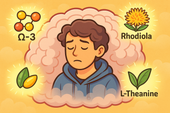
Brain Fog and Body Dysmorphic Disorder: Can Nootropic Supplements Help?
Brain fog often accompanies Body Dysmorphic Disorder, clouding focus and deepening emotional fatigue. Nootropic supplements like L-theanine, Rhodiola, and CoQ10 can help restore mental clarity, balance neurotransmitters, and bring calm energy back to the mind 🌿🧠.
-

How Stress Hormones Like Cortisol May Worsen Body Dysmorphic Disorder
Chronic stress floods the brain with cortisol — the hormone that keeps you on high alert. In Body Dysmorphic Disorder, this chemical overdrive fuels anxiety, distorts self-image, and traps the body in survival mode. Calming cortisol helps restore both peace and perspective 🌿🧠.
-

The Role of Neurotransmitters in BDD—and How Supplements May Help
Neurotransmitters like serotonin, dopamine, glutamate, and GABA shape how people with Body Dysmorphic Disorder perceive themselves. When these brain messengers fall out of balance, perception distorts — but targeted supplements can help restore calm, focus, and emotional regulation 🧠🌿.
-

What Is Body Dysmorphic Disorder? A Deeper Look at the Mind-Body Connection
Body Dysmorphic Disorder (BDD) isn’t just about appearance — it’s about perception. When brain chemistry, trauma, and stress distort self-image, the mind begins to see flaws that aren’t truly there. Healing starts by calming the nervous system and reconnecting mind and body 🪞🧠.
-

Keeping Calm in Competitive Sports: How to Train Your Mind, Body, and Chemistry for Peak Performance
Competitive pressure can overwhelm even the strongest athletes — but calm is trainable. By combining supplements like magnesium, L-theanine, and adaptogens with breathwork and mindset training, you can stay focused, balanced, and in control under any level of stress 🧠🏅.
-
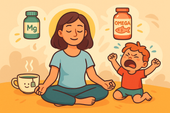
Supplements for Parents Facing Toddler Tantrums: Staying Calm When Little Emotions Run Wild
Toddler tantrums can drain even the most loving parent — but your calm is powerful. With the right supplements like magnesium, L-theanine, and ashwagandha supporting your nervous system, you can stay patient, grounded, and kind, even when emotions run high 🧸🌿.
-

Workplace Stress and Anger Management Support
Workplace stress can quickly turn into frustration — but calm is a skill you can train. By combining supplements like magnesium, L-theanine, and adaptogens with breathwork and mindset tools, you can stay focused, patient, and emotionally grounded no matter how intense the office gets 💼🌿.
-

How to Stay Patient With Family During Stressful Holidays
Holiday gatherings can stir up old stress and test your patience — but calm is possible. With nervous system support from magnesium, L-theanine, and adaptogens, plus mindful breathing and clear boundaries, you can stay centered, kind, and grounded even when family chaos unfolds 🎄💞.
-

Supplements to Keep Calm During Traffic Jams
Getting stuck in traffic doesn’t have to ruin your mood. With calming supplements like magnesium, L-theanine, and ashwagandha, you can train your body to stay relaxed and focused behind the wheel — turning gridlock into a moment of grounded patience 🚗🌿.
-
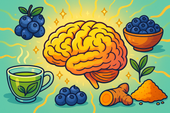
The Role of Antioxidants in Healing Brain Stress from Dissociation
Antioxidants protect the brain from the oxidative stress caused by trauma and dissociation. By neutralizing free radicals and supporting mitochondrial recovery, they help restore clarity, focus, and emotional balance — allowing the mind to heal at the cellular level 🌿🧠.
-
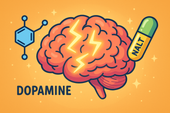
N-Acetyl L-Tyrosine (NALT) for Supporting Mental Clarity
N-Acetyl L-Tyrosine (NALT) fuels dopamine production — the neurotransmitter of focus and motivation. By supporting brain chemistry during stress, NALT helps restore mental clarity, energy, and alertness, making it easier to think clearly and feel present again ⚡🧠.
-

How Ginseng May Improve Focus and Energy in Dissociation
Ginseng helps combat the mental fatigue and fog that often come with dissociation. By supporting mitochondrial energy, balancing neurotransmitters, and regulating cortisol, it gently restores focus, motivation, and emotional presence — helping the mind reconnect with clarity and strength 🌿⚡.
-
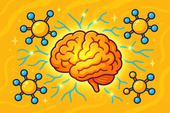
Phosphatidylserine and Dissociation: Supporting Cognitive Function
Phosphatidylserine helps calm the stress response by balancing cortisol, the body’s primary stress hormone. By lowering cortisol spikes, it protects memory, focus, and emotional stability — restoring clarity and mental presence for those struggling with dissociation 🧠🌿.
-
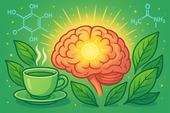
Can Green Tea Extract Help with Dissociative Brain Fog?
Green tea extract may help lift dissociative brain fog by supporting neurotransmitter balance, reducing inflammation, and enhancing energy at the cellular level. With its key compounds EGCG and L-theanine, it promotes calm focus, clarity, and emotional presence — helping you feel more alert and grounded 🍵🧠.
-
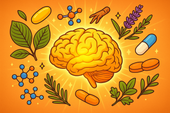
Building a Natural Supplement Stack for Dissociation Support
Building a supplement stack for dissociation means nourishing the brain and body back into communication. By supporting neurotransmitters, gut health, and energy balance through nutrients like magnesium, omega-3s, curcumin, and probiotics, you can help restore clarity, calm, and connection — one layer at a time 🌿🧠.
-

Chamomile and Lavender for Dissociative Anxiety Relief
Chamomile and lavender work together to calm dissociative anxiety by soothing the nervous system and restoring emotional safety. Their natural compounds balance cortisol, enhance GABA activity, and activate the vagus nerve — helping you feel grounded, connected, and at peace again 🌿💜.
-
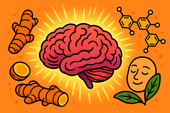
Curcumin for Inflammation and Mental Clarity in Dissociation
Curcumin, the golden compound in turmeric, does more than fight inflammation — it helps clear the mental fog often tied to dissociation. By calming neuroinflammation, balancing neurotransmitters, and supporting mitochondrial energy, curcumin can restore mental clarity, focus, and emotional presence 🌿🧠.
-
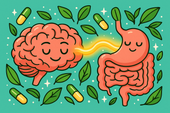
Probiotics and Dissociation: Exploring the Gut–Brain Axis
The gut–brain axis plays a vital role in emotional awareness and presence. When the microbiome is balanced, it supports serotonin production, vagus nerve activity, and calm focus. Probiotics help repair this connection — restoring safety, clarity, and the feeling of truly being in your body again 🌿🧠.
-
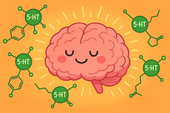
5-HTP for Dissociation: Supporting Serotonin and Emotional Stability
5-HTP helps bridge the gap between emotional numbness and stability by supporting serotonin production — the neurotransmitter that shapes mood, sleep, and sensory awareness. For people experiencing dissociation, 5-HTP may gently restore connection, presence, and emotional balance from the inside out 🌿🧠.
-
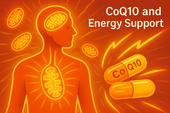
CoQ10 and Energy Support for People with Dissociation
Chronic dissociation often leaves the body running on empty — tired, foggy, and disconnected. CoQ10 helps recharge that system at the cellular level by restoring mitochondrial energy, reducing oxidative stress, and supporting the brain’s capacity to stay present. It’s energy medicine for both body and mind ⚡🧠.

















































